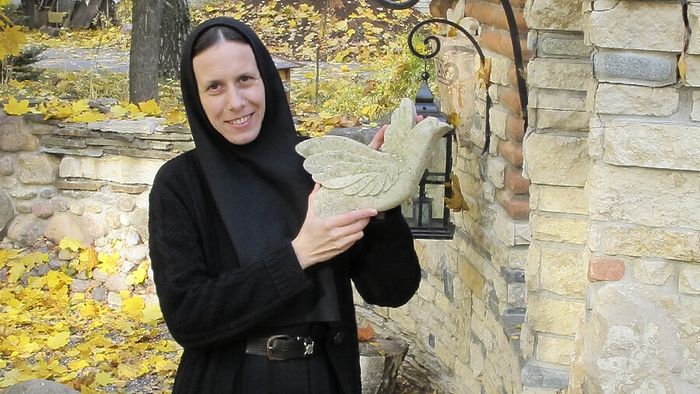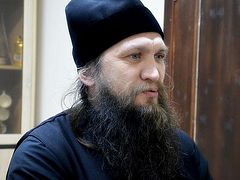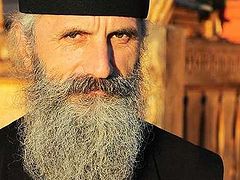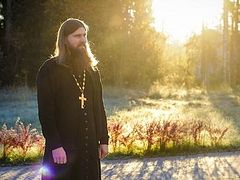Meeting God is always personal, mystical, and incomprehensible. The monastic sisters of our monastery share their stories of when and under what circumstances they heard the Lord and responded to His call.
Mother Tamara (Ignatovich):
I was baptized at the age of eighteen. My sister was getting married, and I had to get baptized. For me, it was just a ritual—something I had to do. No one ever told me about the Church and God before.
I wasn’t planning to go to church after my Baptism, but I decided to leave my cross on. However, thanks to this step, even if not completely conscious, there was a breakthrough in my interior life. I clearly remember how after a while I started to think: What is life in general? What is the meaning of life? I felt an imbalance, a bifurcation. On the one hand, you make friends, you talk, you go out, you break up—you can have all the joys of life. On the other hand, all of this external vanity can’t fully satisfy you—the soul wants something else. But I didn’t know what exactly. I associated it with my youthful struggles, emotions, infatuations.
Then people started telling me about the Church, God, and Christ. At first, all these conversations grated on my ears. But at a certain point, the internal tension reached its peak. It became unbearable, so I went to church. This was in 1996, on the Dormition of the Theotokos. Like many people when they first go to church, I became physically ill and had to be “carried” out of the church every five minutes. But stubbornness won out: “No, I will stay until the end.” I went out, I went in; I went out, I went in…
The next time I went to church was out of stubbornness again. Sometimes it helps. I wondered if I could make it, since others were standing. I don’t remember how I felt anymore, but apparently some kind of peace came, because I started going to church every week. Then someone gave me a book where I read about confession and Communion. Then I somehow wound up confessing to Fr. Andrew Lemeshonok.1 He told me to commune as often as possible. I listened to him.
There’s an expression: “To meet the living God.” I’m not certain I met Him at that moment. It was just some kind of inspiration, an uplifting.
An understanding of Who the living God is came two years later. It happened at a residential care facility. I was already in the sisterhood2 then. We were going to commune and were waiting for confession. But Fr. Andrew came out and said he was just going to cover us with his stole and read the prayer of absolution. A thought flashed through my mind: “How could he do that—just covering us with his stole? I prepared to tell him my sins…” And when Batiushka covered me with his stole and read the prayer, I suddenly felt that Christ was standing next to me. I don’t even know how to convey it. I understood that the Lord forgives not for my supposed “repentance,” but really just like that…
Twenty years have passed, but I still remember that feeling. That’s when I met the living God. It’s impossible to forget. I live by this meeting; I remember it. I haven’t experienced anything else like that, even when I feel true shame for my sins in confession, when I feel my sinfulness. And I live in hope that this meeting will be repeated someday.
Man wants comfort and support, and we seek it in people, in words. But true comfort is possible only when God is standing next to you.
Mother Antonina (Semenova):
When I was sixteen, my parents suddenly started insisting that I get baptized, although they themselves weren’t religious and didn’t go to church. I resisted, but my father convinced me after promising to make me a beautiful silver cross. So, for the sake of the jewelry, which my father always did very beautifully, I agreed. I had a completely unserious, even audacious attitude towards my Baptism.
Then I went to school. I graduated from a technical school and enrolled in an institute.
I had two close friends who, as it turned out, had started going to church, but I didn’t know anything about it. They were worried about me and prayed for me. I protested for about four years. I trusted these people, but not enough to go to church. I had a different philosophy for life, with the typical reasoning: What’s the point of God at all? You can do something good in life anyways, and all these formalities are useless. But in the end their faith won out, and they somehow managed to get me to church.
Then something happened where God revealed great beauty to me in another person. I’d never seen that in people. Then I realized that it was probably God revealing His beauty to me, but I, of course, had confused it with a human beauty. I had to fight it for a long time. And for a long time I addressed a question to God that was tormenting me—even a protest: “You revealed it to me Yourself; I didn’t ask for it. What am I supposed to do now? I don’t understand.” I didn’t understand for quite a long, painful time.
And then, on Nativity, I heard an answer. That was probably my first conscious meeting with God. And I accepted His answer. It was very painful. But in this pain was God’s love. It was the first bright meeting of unbearable inner pain and God’s love at the same time.
After that, everything—people, and nature, and the weather—changed. I felt that God exists and that He loves me. The world was transfigured. I began to see beauty in everything. God revealed a great beauty to me in His love for man.
Mother Rufina (Fillipovich):
When I was twenty-five or twenty-six, I went on a tour of the Golden Ring in Russia. It was a tourist trip, but we spent the night in a monastery in Khotkovo, and on Pascha we went to the service in the Holy Trinity-St. Sergius Lavra, just out of curiosity. I didn’t understand anything, and I even thought it was funny. But I bought a small plastic icon of the Kazan Mother of God in Khotkovo. And it just lay there, hidden in a box, like a souvenir.
By the time I was thirty, my happy, carefree, vivid, and joyful life, which I really liked, started to get a little boring. Family life seemed boring. What was I to do? It was a dead end.
You can put on any mask or garb and pretend that everything is so carefree and everything is wonderful, but, when you get home, you become yourself, and you see what is really inside of you. And it’s a dead end. There’s no way out. I started thinking about the meaning of human life, and I came to the conclusion that there is no meaning. Life ceased to be free.
I thought about it a lot. Then the enemy slipped me a newspaper, Kosomolskaya Pravda as I now recall, where there was a long article talking about how some political prisoner in a concentration camp said that when it was completely unbearable, he had thoughts of suicide. After all, you’re the master of your own life, and you can stop everything yourself and become free. It seemed like a way out for me.
Then suddenly I remembered the plastic icon of the Theotokos from Khotkovo. I just looked at it and thought there was no meaning to life.
To this day, I am certain that the Theotokos saved me.
On the eve of Palm Sunday, my close friend invited me to church. Unexpectedly for myself, I agreed and canceled all my plans. For some reason, we didn’t go all the way to the cathedral, but got out a stop earlier and wound up at the Church of Sts. Peter and Paul. My friend suddenly asked: “Have you ever been to confession?”
I struggled to leave the church several times, but it was crowded. Really, I could have left, and who knows—maybe that would have been the end of me… But the Lord sees everything. He sent Fr. Vyacheslav, who placed the analogion practically right in front of me. I went up and, as my friend taught me, stated my sins “of deed, word, and thought.” He covered me with his stole and started talking to me: “You know you have a male name? There’s this saint…” I thought: “What is he babbling about?” “You know, come see me. We’ll talk.” I left the church and I realized that something had happened within me.
A week or two later, I suddenly felt myself being drawn to confession.
I had a Gospel at home. Baptists were giving them out door-to-door then. No matter how many times I tried to read it, I couldn’t get through it: This guy fathered this guy, and this guy fathered this guy… Then I opened it, and it was as if the scales fell from my eyes. How could I not understand? How can you see a mote in your brother’s eye if you don’t see the beam in your own? Or do unto others as you would have them do unto you—what’s unclear here? You won’t believe it, but I read the entire Gospel three times a day. There was no better book for me.
God was very careful. First I went to see Fr. Vyacheslav, and he gave me some books. Then Fr. Vasily, and he seemed so spiritual to me… The one I didn’t really like was our Fr. Andrew Lemeshonok. But the Lord arranged it so I wound up confessing to him one time, and that was it… I started to go to his talks, then to the Akathist. Suddenly Batiushka started talking about the sisterhood, but I didn’t want to join a sisterhood. Why should I go see the sick, deny myself something, and take care of someone? And who will take care of me? Then I heard the voice of God within me: “I will take care of you.” This is how I met the Lord.







